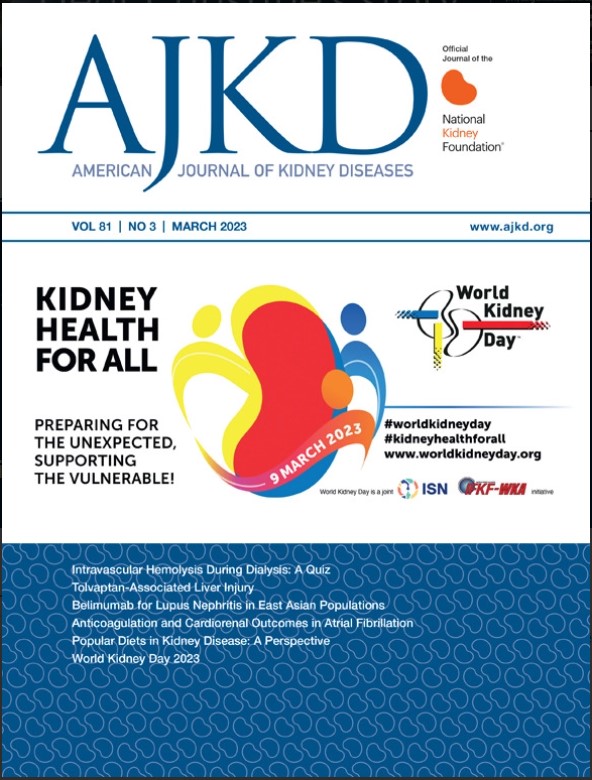成人动脉粥样硬化性心血管疾病的全身性炎症和不良肾脏结局的风险
IF 8.2
1区 医学
Q1 UROLOGY & NEPHROLOGY
引用次数: 0
摘要
理由与目的:炎症小体激活参与动脉粥样硬化性心血管疾病(ASCVD)和慢性肾脏疾病(CKD)的发病机制。本研究调查了c反应蛋白(CRP)测量的全身性炎症是否与成人ASCVD患者的不良肾脏结局相关。研究设计:回顾性队列研究。背景和参与者:83,928名瑞典斯德哥尔摩ASCVD成人患者,在2007年至2021年期间接受了常规CRP检测。暴露:CRP定义为3个月确定窗口内血清CRP水平的几何平均值,不包括可能与急性炎症过程相关的CRP值。结果:AKI(基于诊断代码或KDIGO血清肌酐标准)和复合肾脏结果定义为eGFR持续下降30%或肾衰竭。分析方法:因由特异性Cox比例风险回归。结果:54%的队列患者为男性,平均年龄71岁。59%的参与者有全身性炎症(CRP≥2mg /L)。在中位随访6.4年(四分位数范围为3.1-9.8年)期间,记录了8371例肾脏事件,10757例AKI事件和24954例死亡。与CRP 1-3 mg/L相比,CRP >3-10 mg/L为1.24 (1.17-1.32),CRP >10-20 mg/L为1.35(1.25-1.46)。AKI的hr分别为1.18(1.12-1.25)、1.34(1.27-1.42)和1.37(1.28-1.47)。局限性:观察性研究固有的无法测量的混淆。结论:在这个大型ASCVD成人队列中,CRP水平升高与肾脏不良结局的高风险相关。本文章由计算机程序翻译,如有差异,请以英文原文为准。
Systemic Inflammation and the Risks of Adverse Kidney Outcomes in Adults With Atherosclerotic Cardiovascular Disease
Rationale & Objective
Inflammasome activation is involved in the pathogenesis of atherosclerotic cardiovascular disease (ASCVD) and chronic kidney disease (CKD). This study investigated whether systemic inflammation, measured by C-reactive protein (CRP), is associated with adverse kidney outcomes in adults with ASCVD.
Study Design
Retrospective cohort study.
Setting & Participants
83,928 adults with ASCVD in Stockholm, Sweden, who underwent routine CRP testing between 2007 and 2021.
Exposure(s)
CRP was defined as the geometric mean of serum CRP levels within a 3-month ascertainment window, excluding CRP values potentially associated with an acute inflammatory process.
Outcome(s)
Acute kidney injury (AKI; based on diagnosis code or Kidney Disease: Improving Global Outcomes [KDIGO] serum creatinine criteria) and a composite kidney outcome defined as a sustained >30% decrease in estimated glomerular filtration rate or kidney failure.
Analytical Approach
Cause-specific Cox proportional hazards regression.
Results
54% of the cohort was male, with a mean age of 71 years, and 59% of participants had systemic inflammation (CRP ≥2 mg/L). During a median follow-up of 6.4 years (IQR, 3.1-9.8 years), 8,371 kidney events, 10,757 AKI events, and 24,954 deaths were recorded. Compared with CRP <1 mg/L, higher CRP categories were associated with increased risks of both outcomes. Compared with a CRP of ≤1 mg/L, the adjusted HRs for the composite kidney outcome were 1.16 (95% CI, 1.09-1.23) for CRP >1-3 mg/L, 1.24 (1.17-1.32) for CRP >3-10 mg/L, and 1.35 (1.25-1.46) for CRP >10-20 mg/L. For AKI, the HRs were 1.18 (1.12-1.25), 1.34 (1.27-1.42), and 1.37 (1.28-1.47), respectively.
Limitations
Unmeasured confounding inherent to observational studies.
Conclusions
In this large cohort of adults with ASCVD, increased CRP levels were associated with higher risks of adverse kidney outcomes.
Plain-Language Summary
Inconsistent evidence exists regarding the association between the circulating blood marker of inflammation C-reactive protein (CRP) and kidney outcomes. We conducted an observational study in more than 83,000 adults with atherosclerotic cardiovascular disease undergoing routine care. The study showed that CRP levels were higher in participants with lower levels of kidney function and that CRP was associated with more rapid declines in kidney function over time as well as a greater risk of acute kidney injury.
求助全文
通过发布文献求助,成功后即可免费获取论文全文。
去求助
来源期刊

American Journal of Kidney Diseases
医学-泌尿学与肾脏学
CiteScore
20.40
自引率
2.30%
发文量
732
审稿时长
3-8 weeks
期刊介绍:
The American Journal of Kidney Diseases (AJKD), the National Kidney Foundation's official journal, is globally recognized for its leadership in clinical nephrology content. Monthly, AJKD publishes original investigations on kidney diseases, hypertension, dialysis therapies, and kidney transplantation. Rigorous peer-review, statistical scrutiny, and a structured format characterize the publication process. Each issue includes case reports unveiling new diseases and potential therapeutic strategies.
 求助内容:
求助内容: 应助结果提醒方式:
应助结果提醒方式:


